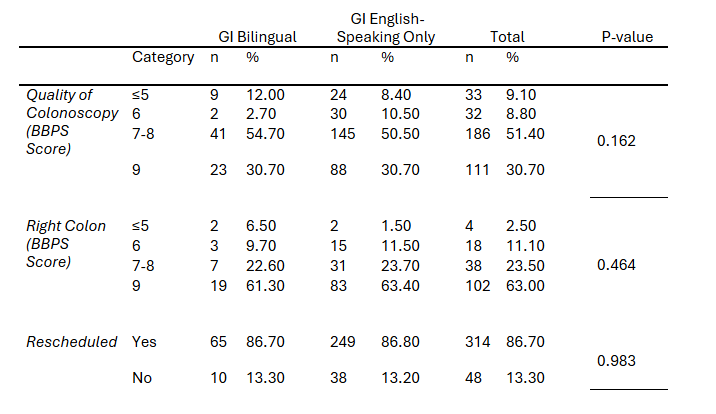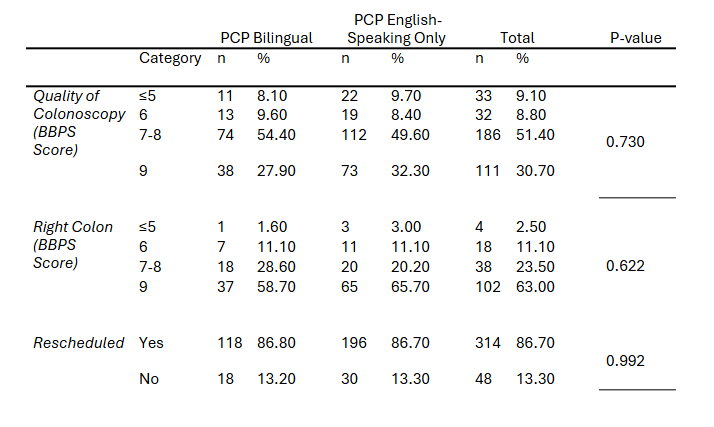Tuesday Poster Session
Category: Colorectal Cancer Prevention
P4758 - Assessing Language Barriers to Completing Colorectal Cancer Screening at a Tertiary Care Center: A Retrospective Cohort Study
Tuesday, October 28, 2025
10:30 AM - 4:00 PM PDT
Location: Exhibit Hall
- KT
Kimberly Tena Diaz, DO (she/her/hers)
Cooper University Health Care
Camden, NJ
Presenting Author(s)
Kimberly Tena Diaz, DO1, Christina Tofani, MD, FACG2, Maryanna Schweininger, DO3, Rahul Menon, BS4, Aamila Shaik, BS2
1Cooper University Health Care, Camden, NJ; 2Cooper Medical School of Rowan University, Camden, NJ; 3Cooper University Hospital, Camden, NJ; 4Cooper Medical School of Rowan University, Philadelphia, PA
Introduction: As rates of colorectal cancer (CRC) continue to steadily increase throughout the United States, more efforts are being made to target colonoscopy screening rates, particularly in vulnerable populations, such as the Hispanic and Latino populations. One area of concern in several studies includes language barriers that may interfere with adequate colonoscopy screenings. The purpose of our study was to evaluate whether language discrepancies between the provider and patient led to inadequate bowel preparation and/or need for repeat colonoscopies.
Methods: This was a retrospective analysis completed at a single-site tertiary care center consisting of patients whose only spoken and written language was Spanish. Primary care providers (PCP) and Gastroenterology (GI) providers whose only known language was English (monolingual) were compared to those who also spoke Spanish (bilingual). Primary outcomes included total bowel preparation scores and right-sided colon preparation scores based on the Boston Bowel Preparation Scoring system (BBPS). Secondary outcomes included the rates of indicated repeat screening colonoscopies and weeks to colonoscopy rescheduling. Primary outcomes were analyzed with Pearson chi-square and secondary outcomes were analyzed utilizing Mann-Whitney U test.
Results: A total of 362 Spanish-speaking patients were included in this study. In the PCP group, there was no statistically significant difference in total BBPS (p=0.730), right colon BBPS (p=0.730), or the rates of patients requiring rescheduling of colonoscopies (p=0.992) comparing bilingual providers to monolingual providers. Similarly, in the GI provider group, there was no statistically significant difference in total BBPS (p=0.162), right colon BBPS (p=0.464), or the rates of patients requiring rescheduling of colonoscopies (p=0.983). In both primary care and GI provider groups, there was no statistical difference in the number of weeks from when the procedure was recommended to actually scheduled in those who were required to reschedule.
Discussion: Primary and secondary outcomes did not differ statistically amongst bilingual providers and monolingual providers. This may be explained by several interventions in place, such as the utilization of interpreters and preparation administration informational pamphlets being in Spanish and English. Additional studies are warranted for further evaluation of barriers to adequate colonoscopy screening.

Figure: Figure 1: GI provider language comparison

Figure: Figure 2: PCP language comparison
Disclosures:
Kimberly Tena Diaz indicated no relevant financial relationships.
Christina Tofani indicated no relevant financial relationships.
Maryanna Schweininger indicated no relevant financial relationships.
Rahul Menon indicated no relevant financial relationships.
Aamila Shaik indicated no relevant financial relationships.
Kimberly Tena Diaz, DO1, Christina Tofani, MD, FACG2, Maryanna Schweininger, DO3, Rahul Menon, BS4, Aamila Shaik, BS2. P4758 - Assessing Language Barriers to Completing Colorectal Cancer Screening at a Tertiary Care Center: A Retrospective Cohort Study, ACG 2025 Annual Scientific Meeting Abstracts. Phoenix, AZ: American College of Gastroenterology.
1Cooper University Health Care, Camden, NJ; 2Cooper Medical School of Rowan University, Camden, NJ; 3Cooper University Hospital, Camden, NJ; 4Cooper Medical School of Rowan University, Philadelphia, PA
Introduction: As rates of colorectal cancer (CRC) continue to steadily increase throughout the United States, more efforts are being made to target colonoscopy screening rates, particularly in vulnerable populations, such as the Hispanic and Latino populations. One area of concern in several studies includes language barriers that may interfere with adequate colonoscopy screenings. The purpose of our study was to evaluate whether language discrepancies between the provider and patient led to inadequate bowel preparation and/or need for repeat colonoscopies.
Methods: This was a retrospective analysis completed at a single-site tertiary care center consisting of patients whose only spoken and written language was Spanish. Primary care providers (PCP) and Gastroenterology (GI) providers whose only known language was English (monolingual) were compared to those who also spoke Spanish (bilingual). Primary outcomes included total bowel preparation scores and right-sided colon preparation scores based on the Boston Bowel Preparation Scoring system (BBPS). Secondary outcomes included the rates of indicated repeat screening colonoscopies and weeks to colonoscopy rescheduling. Primary outcomes were analyzed with Pearson chi-square and secondary outcomes were analyzed utilizing Mann-Whitney U test.
Results: A total of 362 Spanish-speaking patients were included in this study. In the PCP group, there was no statistically significant difference in total BBPS (p=0.730), right colon BBPS (p=0.730), or the rates of patients requiring rescheduling of colonoscopies (p=0.992) comparing bilingual providers to monolingual providers. Similarly, in the GI provider group, there was no statistically significant difference in total BBPS (p=0.162), right colon BBPS (p=0.464), or the rates of patients requiring rescheduling of colonoscopies (p=0.983). In both primary care and GI provider groups, there was no statistical difference in the number of weeks from when the procedure was recommended to actually scheduled in those who were required to reschedule.
Discussion: Primary and secondary outcomes did not differ statistically amongst bilingual providers and monolingual providers. This may be explained by several interventions in place, such as the utilization of interpreters and preparation administration informational pamphlets being in Spanish and English. Additional studies are warranted for further evaluation of barriers to adequate colonoscopy screening.

Figure: Figure 1: GI provider language comparison

Figure: Figure 2: PCP language comparison
Disclosures:
Kimberly Tena Diaz indicated no relevant financial relationships.
Christina Tofani indicated no relevant financial relationships.
Maryanna Schweininger indicated no relevant financial relationships.
Rahul Menon indicated no relevant financial relationships.
Aamila Shaik indicated no relevant financial relationships.
Kimberly Tena Diaz, DO1, Christina Tofani, MD, FACG2, Maryanna Schweininger, DO3, Rahul Menon, BS4, Aamila Shaik, BS2. P4758 - Assessing Language Barriers to Completing Colorectal Cancer Screening at a Tertiary Care Center: A Retrospective Cohort Study, ACG 2025 Annual Scientific Meeting Abstracts. Phoenix, AZ: American College of Gastroenterology.
